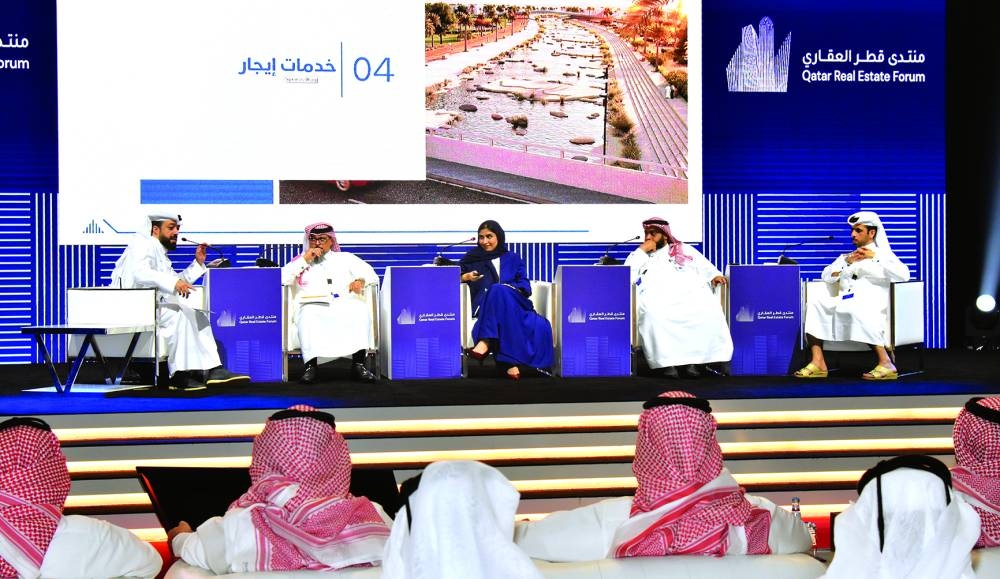A talk at the Qatar Real Estate Forum 2023 Sunday highlighted the key role of technology in shaping sustainable and efficient practices in the sector, citing the latest advancements in digital innovation.
Seven speakers from GCC countries, including Qatar, discussed a number of successful digital programmes and systems that facilitated faster transactions, enhanced transparency and better customer experience, among other positive impacts.
Naif AlSharif al-Zeid, secretary-general of Wafi from Saudi Arabia, cited the success of the Wafi project, which revolutionised the real estate sector by introducing innovative digital solutions.
Due to its innovative approach, he said Wafi received positive feedback from stakeholders, including investors, owners, and developers, as it eliminated challenges related to approvals and transactional processes that often take time.
“The Wafi system is fair for all parties involved,” al-Zeid. Noting that the programme’s fair and efficient system enabled digital transactions, reducing the need for physical presence and streamlining operations.
Maria Ahmed al-Dubaikhi, strategic partnerships manager at the National Housing Company of Saudi Arabia, underlined the transformative impact of the ejar platform (e-leasing platform), serving millions of beneficiaries, ensuring transparency, reducing disputes, and contributing to the country's GDP.
She noted that litigation was significantly reduced from two years to two weeks via the ejar platform, which also created more transparency in transactions and supported services in the banking sector and other funding entities.
Al-Dubaikhi emphasised the platform's expansion plans to offer even more services, aiming to enhance the real estate sector through smart and effective solutions.
Tayseer al-Mufarrej, general manager of strategic communications and spokesperson of the Real Estate General Authority in Saudi Arabia, lauded Qatar's strong infrastructure and real estate platform, saying it serves as a model for the world.
Echoing the views of other speakers, al-Mufarrej said digital governance in the real estate sector enhanced transparency and attracted many investors. The mediation process, for example, introduced innovative solutions, providing flexibility and protecting the rights of all parties involved.
With a unified platform, he added that the system generated several opportunities and increased work efficiency where people can avail of all the services related to mediation.
Amer Saeed al-Ghafri, director of the Real Estate Registration Department at the Ministry of Justice in Qatar, discussed the success of the Sak digital platform, which has significantly reduced the procedures involved in real estate transactions.
The platform, he stressed, contributed in generating accurate and authenticated e-registrations. The system's efficiency, where one person performs the work of multiple individuals, has attracted more investors to Qatar's real estate sector. Like similar programmes, Sak can process transactions in 3o minutes or less.
Al-Ghafri announced that other digital services and features will be enhanced and launched by the end of 2023 or early 2024, saying that they are looking forward to offering excellent services for interested parties.
The second set of panelists continued the discussion and focused on the importance of digital technology in enhancing various services and operations in the real estate sector.
Ziyad al-Shammari, strategic general manager of the Real Estate General Authority in Saudi Arabia, highlights the role of innovation in sustainability and the use of digital tools for data analysis, internal design, and market trends.
He said the real estate sector still needs a lot of innovative solutions for its further development: from helping speed up procedures to using several tools that can be used to support these efforts.
Faris A al-Bassam, international co-operation director of the Real Estate General Authority in Saudi Arabia, praised the Mullak programme, which enables property managers and maintenance companies to offer services to owners' associations, contributing to the realisation of Saudi Arabia's National Vision 2030.
Khalifa al-Zeraim al-Suwaidi, CEO and board member of Emirates Real Estate Solutions in the UAE, underlined the importance of digital transformation in real estate regulations and updates.
He said the digital platform efficiently links partners, service providers, and government agencies, aiding remote transactions and approval processes. It also helps ease of access to services such as mortgaging, registering, and leasing contracts.
The system, al-Suwaidi noted, facilitates hundreds of transactions worth billions of dirhams in the real estate sector, and deals with investors efficiently.

The first set of panelists for 'The digital innovation for sustainable real estate industry' at the forum Sunday. PICTURE: Thajudheen

